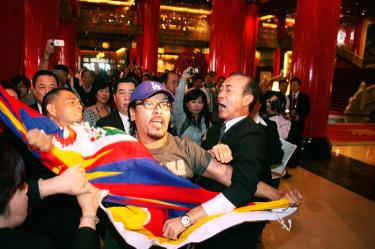 Never mind, Lobsang. We still like you
Never mind, Lobsang. We still like youAS CHINA gears up to celebrate the 60th anniversary of its annexation of Tibet, it has issued a stinging rebuff to the newly elected prime minister of the Tibetan government-in-exile, Lobsang Sangay. The winner of an election among Tibetans outside China, Mr Sangay will have a higher profile than his predecessors, because the Dalai Lama, Tibet’s spiritual leader and international figurehead, has said he will withdraw from his political role.
So Mr Sangay, a 43-year-old fellow at Harvard Law School, has been visiting his electorate, most of whom are in India, and discussing his plans. He offered to negotiate with China “anytime, anywhere”. China responded through an interview in an official magazine, China’s Tibet, with Zhu Weiqun, a frequent Communist Party spokesman on Tibet.
Mr Zhu’s contempt at “that government-in-exile of his” almost splutters off the page: “It’s all just a separatist political clique that betrays the motherland, with no legitimacy at all and absolutely no status to engage in dialogue with the representatives of the central government.”
So the Dalai Lama’s decision to democratise his government-in-exile seems to have made reconciliation with China even less likely. At least, under the old dispensation, a series of fruitless talks between China and Tibetan exiles had lurched ahead every few months since 2002, usually breaking down in acrimony. Even that now seems too much to hope for.
Yet Robert Barnett, a Tibet expert at Columbia University in New York, points out that there is nothing new in China’s rejection of Mr Sangay’s overture. It has never had any truck with the government-in-exile. The Tibetan side in the talks has always been filled by the Dalai Lama’s representatives. That practice can still continue. Indeed, the Tibetan exile parliament, discussing a new constitution, last month approved a draft asking the Dalai Lama and his successors, despite his retirement, to “speak on behalf of the Tibetan people, to explain and discuss their concerns and needs as well as to appoint representatives and envoys to serve the interests of the Tibetan people in any part of the world.”
By distancing himself from the exile government, the Dalai Lama has in effect met a Chinese demand. China could, if it chose, regard it as a concession. It could also look that way on the Dalai Lama’s resignation statement in March, in which he said that two pro-independence “political promulgations” he had made in the past would become “ineffective”. The Dalai Lama has long given up the demand for independence in favour of enhanced autonomy under Chinese sovereignty. China has always presented this as a tactical ruse.
China seems to hope that with the passing of this Dalai Lama, Tibetans, deprived of a leader with superstar status and following, will give up the struggle. He seems in good health, but is now 75. So it may have been alarmed by the Dalai Lama’s remark at a press conference in New Jersey, America, this month, that Tibetans are close to “finalising” the process for finding his successor, that is, his reincarnation as the 15th Dalai Lama. He said that all the schools of Tibetan Buddhism are involved in this.
This unity among the various schools would be unprecedented—and important, since it seems quite likely that the next incarnation of the Dalai Lama will be contested, with one candidate backed by China and one, probably in exile, revered by most Tibetans.
The Dalai Lama appears to retain the loyalty of most Tibetans inside China, too. The focus of Tibetan resistance since March has been around the Kirti monastery in an area of Sichuan province that Tibetans regard as Amdo, part of historic Tibet. Protests that started with the self-immolation of a young monk have seen hundreds of monks detained, two elderly laypeople killed trying to protect them, a continuing heavy security presence in the area, and the burning of books not approved by the authorities.
So, as it celebrates, on May 23rd, the 60th anniversary of the “17-point agreement” in which a young Dalai Lama agreed to accept Chinese sovereignty over Tibet, China knows there is no immediate threat to its rule, but that many Tibetans still resent it. Still, it is, for China, a peculiar document to commemorate. The Tibet it envisages—under Chinese sovereignty but autonomous—seems closer to the Dalai Lama’s demands than to present arrangements. China promised not to alter “the existing political system in Tibet”, a promise swept aside in 1959 as it crushed a Tibetan rebellion and the Dalai Lama and 80,000 followers fled into exile. In 1951 the political system was a feudal theocracy. Now that exiles enjoy the forms of parliamentary democracy, they find China no more trustworthy. China, in turn, finds the exiles’ political system no more appealing.






